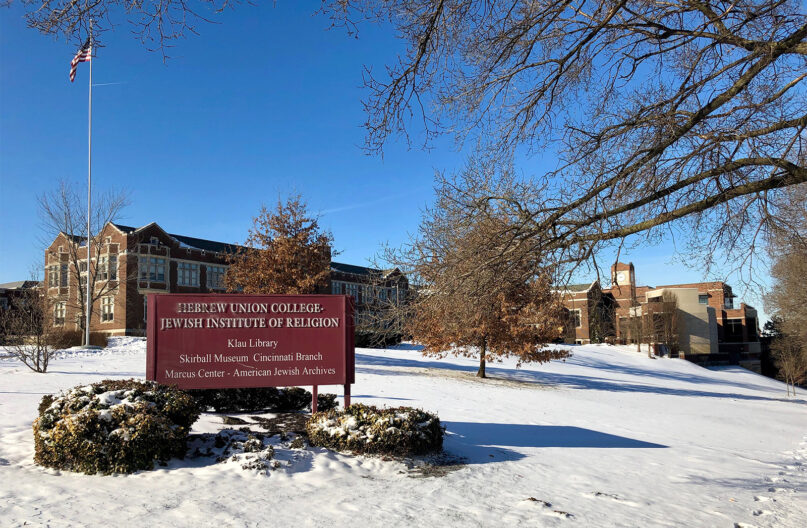(RNS) — A wide-ranging investigation of sexual misconduct in the Reform Jewish movement’s seminary, Hebrew Union College-Jewish Institute of Religion, found extensive sexual harassment and discrimination on the basis of sex and gender over the past five decades.
The report, conducted by independent law firm Morgan Lewis and released to the public Tuesday (Nov. 9), names six former professors who investigators said had engaged in sexual misconduct with students. Two of the six also served as seminary presidents.
Morgan Lewis spoke with 170 witnesses and reviewed hundreds of documents detailing allegations of harassment and discrimination at all four of the seminary’s campuses — Cincinnati, New York City, Los Angeles and Jerusalem — dating back to the 1970s.
The Women’s Rabbinic Network, an independent organization of 600 female-identified rabbis in the Reform movement, congratulated the seminary for its detailed report and recommendations.
“We never thought this day would come,” Rabbi Mary Zamore, director of the network, told Religion News Service. “There’s a mix of gratitude and pain and shock. The report is very difficult to read. At the same time there’s so much hope in this at the level of transparency. We hope this is going to be a positive step forward.”
Reform Jews will mark the 50th anniversary of women in the rabbinate this June. But, as the report shows, many of its rabbinical students said the seminary had an “old boys’ club” mentality that allowed sexual harassment against women and LGBTQ students to fester.
The seminary investigation is one of three in the Reform movement and the first to issue its conclusions. The other two are the Central Conference of American Rabbis, the Reform movement’s rabbinic organization, and the Union for Reform Judaism, which is the congregational arm of the movement.
RELATED: As Reform Jews investigate themselves, a reckoning over sexual abuse grows
Taken together, the investigations signal a desire for a new level of ethical accountability on sexual misconduct and gender discrimination in the largest U.S. Jewish denomination, with some 850 affiliating congregations. The Conservative Jewish movement is also in the midst of an investigation into sexual misconduct in its youth organization.
Hebrew Union College, which enrolls 430 students, launched the investigation earlier this year after the death of Michael Cook, a professor who was credibly accused of sexual misconduct and whose April funeral brought up a lot of anger from women he is alleged to have harassed.
Elana Wien, executive director of SRE Network, a group that advocates for gender equity in Jewish institutions, said sharing the report publicly was groundbreaking.
“I hope this is a model, not just for other entities within the Reform movement and other Jewish movements, but also other faith communities and communal institutions in the secular world as well,” Wien said.
The report details multiple comments and actions against women and LGBTQ students. One woman who was ordained in the 2010s recalled that in her first class, the teacher commented that “a sermon should be like a woman’s skirt: long enough to cover the subject, but short enough to keep it interesting.”
Several women told investigators they had been told to lose weight because being heavy purportedly would negatively affect their job prospects.
But the report also details a graver set of allegations that faculty members forcibly kissed and/or groped female students, offering to give them massages or looking down their blouses.
One woman reported she had a sexual relationship with Cook while she was a student at HUC in the late 1970s and early 1980s, for example. She said Cook invited her to his office to discuss a test she had failed, and the relationship turned into one in which they repeatedly had sex in his office over the course of the next three and a half years.
Another, who served as president and later chancellor of the seminary, Alfred Gottschalk, allegedly invited women to his apartment or hotel room to proposition the students and touch or kiss them. He died in 2009.
The report recommends HUC engage in a truth and reconciliation process, as well as revise its sexual misconduct policies. It also suggests the seminary remove endowed chairs, statues and other recognitions that memorialize wrongdoers and even conduct an optional re-ordination ceremony for those who were ordained by known harassers.
Zamore said she believed the seminary would undertake the recommendations outlined in the report.
“I would not be surprised if more people now come forward,” she said. “My expectation is that this spurs more discussion and more discovery.”
RELATED: Israeli police protect women’s prayer group from ultra-Orthodox protesters





